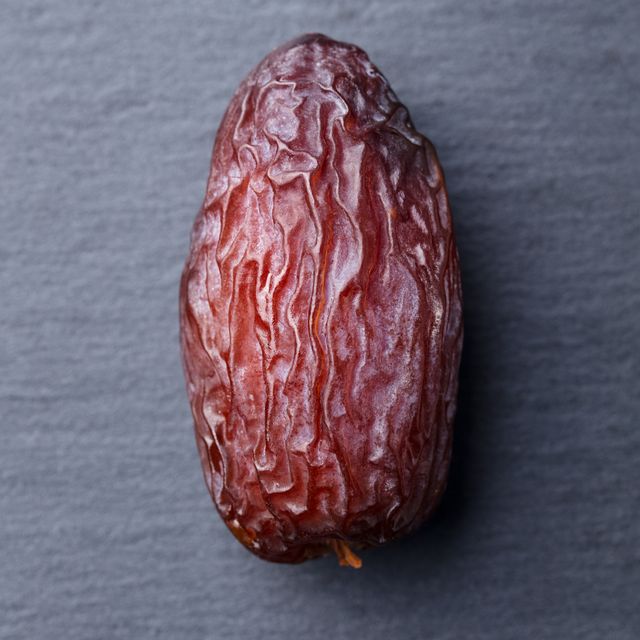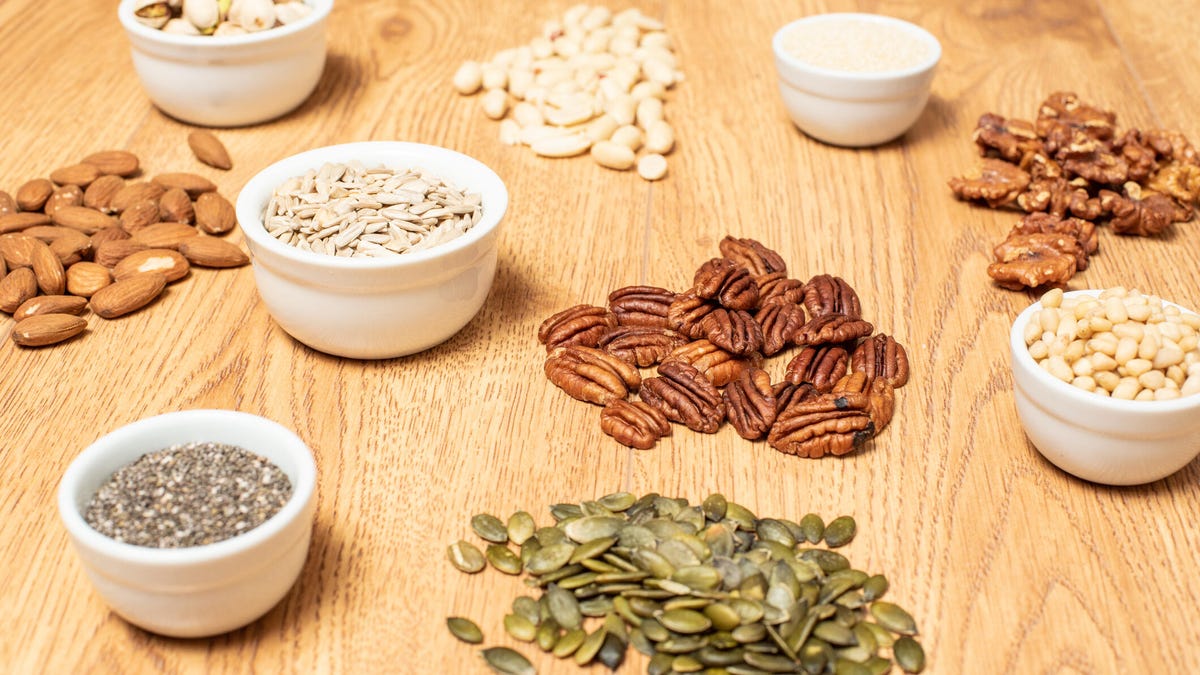
Dates are a super-healthy, super-versatile super-fruit. Grown in a variety of countries (including Egypt, Saudi Arabia and Iran) as well as in California and Arizona, the fruit is widely available fresh or dried — and both are delicious.
“There are a wide an assortment of varieties, and each one has different rich flavors,” says Michael Crupain, M.D., M.P.H., author of The Power Five: Essential Foods for Optimum Health, who’s on the faculty of Johns Hopkins Bloomberg School of Public Health. “While some people worry about their sugar content, dates are actually a low glycemic index food, in part because they are rich in fiber. Dates are a great substitute or go-to when you’re craving something sweet.”
Whether you eat them as snacks, or use them in sweet or savory dishes, you’re getting a host of health benefits.
Dates nutrition facts
Here are the overall nutritional stats of Medjool dates, a highly popular variety:
Four pitted Medjool dates have:
- 266 calories
- 1.7g protein
- 72g carbohydrates
- 6.4g fiber
- 64g sugars (total)
- 62mg calcium
- 52 mg magnesium
- 60 mg phosphorous
- 668 mg potassium
- 86 ug beta-carotene
- 144 IU vitamin A
Health benefits of dates
✔️ Dates are highly nutritious
As Dr. Crupain pointed out, dates are high in natural sugar, and high in calories as well (if that’s something you’re keeping an eye on). That said, they have only a negligible amount of fat, and their host of health-boosters like fiber and antioxidants, as well as other beneficial compounds, give them their superfruit profile.
✔️ Dates are a superfood
You may have seen dates referred to as a superfood and wondered if that’s actually true. “A superfood is food that’s packed with nutrients and delivers health benefits,” says Dawn Jackson Blatner, RDN, author of The Superfood Swap. “Dates can be considered a superfood because they’re rich in beneficial compounds, such as polyphenols. Preliminary research suggests that these polyphenols in dates — and likely other beneficial compounds — are associated with a wide variety of health benefits.”
✔️ Dates are rich in antioxidants
Research shows that dates are abundant in phenolic antioxidants (including catechins) as well as flavonoids, which have antioxidant properties. Here’s why antioxidants are great for your health: They fight free radicals (cell-damaging chemicals), repair DNA and help keep our cells healthy, according to Harvard School of Public Health. That’s one reason why a diet that’s full of fruits and vegetables is especially healthy for us humans.
✔️ Dates are high in fiber
According to the Mayo Clinic, dietary fiber is a key component of a healthy diet, keeping your digestion system chugging along and reducing your risk for heart disease, diabetes, and certain types of cancer, as well as helping you stay at a healthy weight. And like other fruits, dates are a good source. Says Dr. Crupain, “Two dates have about 3 grams of fiber—a little over 10% of the daily recommended amount. The fiber in dates is important for helping you feel full, feeding your gut bacteria, and keeping you regular.”
✔️ Dates are a heart-healthy food
“Dates are a heart-smart food primarily because of their antioxidants and fiber content,” says Blatner. “They contain antioxidant compounds like polyphenols, which may decrease inflammation to support heart health. And the fiber in dates can support healthy cholesterol and triglyceride levels.” All in all, this can add up to a stronger ticker!
✔️ Dates have bone-building benefits
There are various nutrients in dates that are beneficial for bone health. “They contain phosphorus, magnesium, and calcium,” Blatner points out. “However these minerals are not in high amounts, so while dates have benefits they’re not officially considered ‘good sources.’” She adds, however, “Dates are a good source of copper [19%DV], which is another mineral that may support healthy bones.”
✔️ Dates are versatile
“Dates are naturally sweet and chewy, and they’re versatile as well,” says Blatner. “I consider them ‘nature’s caramel’ because they have a rich caramel-like flavor, but you can also use them in savory recipes. Dates have a pit in them, so get them already pitted or make sure to remove the pits before eating.”
FAQ
How many dates can a person eat in a day?
“Medjool dates tend to be the most popular in the U.S.— you can enjoy two or three of these dates a day, since that’s considered one serving,” says Blatner. “That gives you space in your day to enjoy other types of fruits as well.” And then you’ll get even a greater variety of nutrients!
How to eat dates
Here are some ideas from Blatner for enjoying dates:
- Stuff dates with nut butter, goat cheese, or even chopped nuts for a snack.
- Add chopped dates to oatmeal or yogurt parfaits.
- Put chopped dates in salads; Blatner especially loves the combo of kale, dates, chopped nuts, and Parmesan.
- Mix chopped dates into a batch of homemade granola.
- Use dates as a binder when making energy bites.
- Put dates in smoothies to naturally add sweetness.
- Enjoy two-ingredient brownie bites by blending dates with cacao powder.

Executive Director
Lisa (she/her) is the executive director of the Hearst Health Newsroom, a team that produces health and wellness content for Good Housekeeping, Prevention and Woman’s Day. Formerly the executive editor of Women’s Health, The Good Life and Parenting magazines and a senior editor at Esquire and Glamour, she specializes in producing investigative health reports and other stories that help people live their healthiest possible lives. She has won many editing awards, including the National Magazine Award.
Nutrition Lab Director
Stefani (she/her) is a registered dietitian, a NASM-certified personal trainer and the director of the Good Housekeeping Institute Nutrition Lab, where she handles all nutrition-related content, testing and evaluation. She holds a bachelor’s degree in nutritional sciences from Pennsylvania State University and a master’s degree in clinical nutrition from NYU. She is also Good Housekeeping’s on-staff fitness and exercise expert. Stefani is dedicated to providing readers with evidence-based content to encourage informed food choices and healthy living. She is an avid CrossFitter and a passionate home cook who loves spending time with her big fit Greek family.
link




:max_bytes(150000):strip_icc()/Best-Condiments-for-Better-Blood-Sugar-According-to-Dietitians-aa44e694e2324a269ad75f1518d40d2f.jpg)

